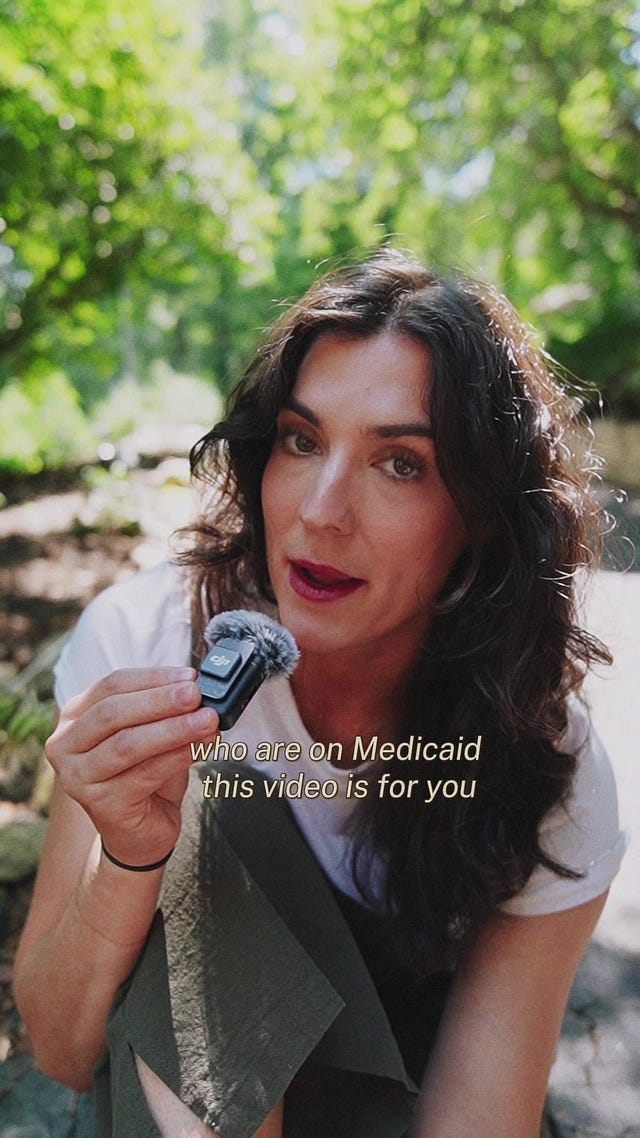Mutual Aid and the Potential Collapse of Healthcare in America
Navigating What The Big Deadly Bill Means for Us
It’s been a couple weeks since the Big Deadly Bill passed in Congress. And among many horrific things, one of the most catastrophic is the significant decrease of $1 Trillion in cuts Medicaid. This is going to be catastrophic to millions of people who rely on Medicaid, many of whom are children with disabilities. It will have very immediate effects to rural hospitals that are, effectively, in business because of Medicaid funds. It is unconscionable that anyone voted for this bill which is as good as signing a death sentence for hundreds of thousands of their constituents and beyond.
As such many who rely on Medicaid are trying to figure out what to do. As I was trying to grapple with what this all means, I came across this PlaySpark TikTok with a call to action for parents of kids with disabilities. She calls on thinking ahead, preparedness, and mutual aid and is an example of the kind of determination, action, and resilience needed in crises.
 Tiktok failed to load.
Tiktok failed to load.Enable 3rd party cookies or use another browser
A personal disclaimer here: I exist within a privileged bubble where we are on my husband’s employer healthcare and we are all generally healthy. Aside from some future surgeries to correct my son’s cleft, we don’t have a ton of healthcare needs at the moment. So I do not rely fully on federal funding that people with disabilities, parents of children with disabilities, the elderly, the chronically ill, and low-income folks do. But I’m learning a great deal. This post is part of that learning.
This PlaySpark post stuck out to me specifically because the call-to-action was not just a warning to stock up on all that you can to withstand the worst of what is to come. But also, it’s a call to collective action to support the entire community of people who are the most vulnerable to the Medicaid cuts. It is a call to band together and do what they can to keep all their kids safe and healthy in what is going to be very meager and difficult times. It is a call for mutual aid.
We can learn so much from this approach. Most of us who grew up in the United States were raised valuing independence above all else. And while independence can be a good trait in moderation, it has been overvalued and put us all at risk. We have lost a sense of solidarity for the community around us. But it is in community that we can ward off the worst of what is to come.
What many of us—particularly those in the privileged bubble like me—don’t realize is the precariousness of our healthcare system. Yet many of us are just a cancer diagnosis away from bankruptcy. And while we still pay millions, collectively, per year to insurance companies that might not even cover our basic needs based on arbitrary determinations, that same healthcare system relies so much on the federal funding that millions of patients receive from medicare and medicaid. We think we’re participating in something personal when it really is the power of the whole that prop this entire system up. And we will all soon find out what the loss of that governmental support has for the entire system.
It is in these moments where we need to look to one another to find a way through.
Because I’m not a medical expert, I don’t have specific recommendations about what to stock up on when it comes to medical preparedness (although the basics we discuss in the First Aid & Medication episode might be useful at this point), but what I can say is that mutual aid is going to be the answer when the gap in social support widens because of this bill.
Look to the people around you who you can support and when you are in need, you can guarantee those people will also be there for you. The only way to get through this is to look for ways to participate in collective action and mutual aid.






I've been buying up a library's worth of material on herbal remedies. These things can't perform all of the miracles, but they often do have some fairly miraculous effects regardless.